- Sep 22, 2013
- 4,956
- 250
- 85
Does modern media make you think of traffic panic (e.g., WikiLeaks, ISIS, etc.)?
This media yarn was inspired by Canadian Bacon.
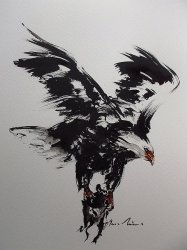
====
"Americans adored social leaders like Dan Quayle and Thomas Jefferson who were incidentally very popular in political cartoons. Thomas Nast, the iconic political cartoonist of yesteryear, made political commentary feel very 'pedestrian' and his legacy is felt today in politics-critique programs such as Saturday Night Live and Spin City. This is America..."
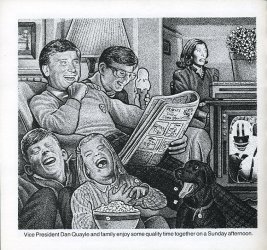
"A handful of idealistic Internet-boggers considered themselves to be 'new age vigilantes' (blogging about radical and controversial topics such as anti-TrumpUSA capitalism protests in the age of media and TV). These 'vigilantes' would sometimes even dress up in outrageous costumes and sit in funny poses to give the Thomas Nast 'aesthetic' in America a little 'spice.' These 'vigilantes' were not dangerous (like terrorists); they were simply 'comedians'."
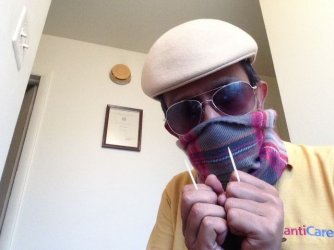
"Americans who detested the spam and low-brow consumerism proliferated on the Internet despised these 'self-proclaimed Internet philosophers' since (basically) the Internet was an arena for all kinds of pedestrian gibberish (e.g., random blogs/posts about craving Burger King coupons). These Americans who detested these 'Internet vigilantes' hailed from all walks of life, and some were even part of the criminal underworld (and honestly wondered if this modern age of media 'noise' was something of a 'craze' rather than anything resembling a 'movement')."

"Americans do of course 'entertain' low-brow entertainment and 'youthful dialogue' (e.g., MTV). The Internet was full of random doodles and blurbs about 'homemade patriotism' (e.g., stick-figure doodles of comic book super-villains such as Marvel Comics' Scorpion, a toxin-wielding mutant terrorist and urban menace, symbolizing political cynicism). These random doodles and 'imagination-stains' (or spam) were meant to incite dialogue about the right to spread random chatter in the age of 'very convenient networking' (i.e., Facebook). Media was catering to a 'fried-chicken lyceum'."
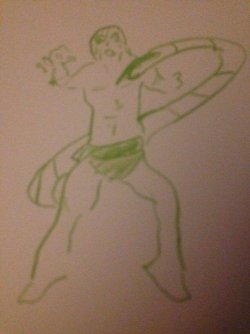
"A historian might recount the glory days of political debate during the reign of the Roman Senate (in that 'great Empire'), when political criticism was both more regal and more serious. However, the world had changed so much since then, and social dialogue was much more 'friendly' (and hence low-brow). No one remembered Rome. What replaced Socratic debate was of course brain-candy junk like The People's Court and The Jerk. The advent of media made discourse very 'child-like'."
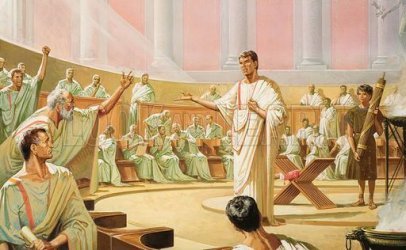
"American super-celebrities (e.g., Tom Cruise, Tom Hanks, Leo DiCaprio) were fascinated by stories/screenplays about great deeds of social mobilization (e.g., Vietnam veteran care, WWII drama, Wall Street intrigue, etc.). New age films therefore revealed a special American interest in folklore rather than intellectualism. That seemed perfectly 'natural' and 'graphic' films such as Fight Club and The Incredibles represented 'civil playgrounds'."
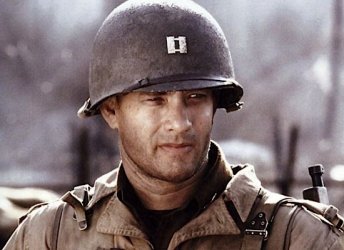
"As the NSA (National Security Agency) developed a handsome new 'cyber-division' which would monitor all kinds of Internet activity on America's home-turf (the 'Homeland'), social critics wondered if Internet-hackers were a new breed of terrorist. The security of the Internet was a concern primarily because of commerce (i.e., Amazon.com, eTrade), however, intellectual property securities could be undermined by hackers invading security/office files (since virtually everything was now computerized), so it became an ironic 'terrorism' fear. Our friendly blogging self-proclaimed 'Internet-vigilantes' were therefore the 'New Rascals'."
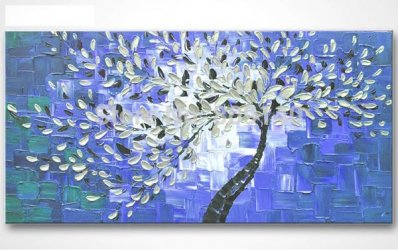
"The Christian Bible states that at the prophetic End of Days, all kinds of unusual 'characters' will surface to 'complement' the return of Jesus Christ (during Armageddon) and the rise of God's mighty archangel Michael. These 'incendiary characters' included the AntiChrist, the false prophet, the mysterious manslayer, the fearful Harlot of Babylon (a woman atop a dragon), Apollyon (master of the enigmatic 'bottomless pit' of desolation), and Satan (the adversary of God). Would Christians believe the apocalypse would create mass hysteria regarding the 'everyday living' conveniences created by media-culture conveniences (e.g., MTV, QVC, ESPN, etc.)? In other words, would the apocalypse remind humanity why democracy itself had become something of a 'toy'?"

GOD: Americans make great toys, computers, and batteries (and burgers).
SATAN: Indeed; Fisher-Price, Apple, Energizer, and Burger King are 'totems.'
GOD: Capitalism is global, and media has made it 'convenient.'
SATAN: Maybe convenience is making humans lazier...or dumber!
GOD: I disagree; I think it's simply creating cholesterol avoidable with leadership.
SATAN: So you're an advocate of the FDA and MTV?
GOD: I like anything promoting peaceful/friendly (and democratic!) socialization.
SATAN: What do you make of these 'Internet vigilantes' and 'celebrities'?
GOD: I've heard of a few intriguing 'characters' (e.g., Ajay Satan, Tom Hanks).
SATAN: Yes, media is making for 'strange' pedestrian diplomacy (e.g., The Real World).
GOD: Yes, MTV has made graffiti...'crunchy.'
SATAN: It's like the cheeseburger-rendition of the Roaring Twenties.
GOD: The Great Gatsby has been replaced by Ronald McDonald.
SATAN: Maybe anti-capitalism terrorists (i.e., ISIS, Cobra) will despise WikiLeaks.
GOD: Captain America (Marvel Comics) is popular, so the world will embrace networking.
SATAN: Idealism towards treaties (e.g., NATO) creates demand for 'eccentric heroism.'
GOD: Isn't that why James Bond is so appealing?
SATAN: Let's go watch Newsies on Netflix!
====


This media yarn was inspired by Canadian Bacon.

====
"Americans adored social leaders like Dan Quayle and Thomas Jefferson who were incidentally very popular in political cartoons. Thomas Nast, the iconic political cartoonist of yesteryear, made political commentary feel very 'pedestrian' and his legacy is felt today in politics-critique programs such as Saturday Night Live and Spin City. This is America..."

"A handful of idealistic Internet-boggers considered themselves to be 'new age vigilantes' (blogging about radical and controversial topics such as anti-TrumpUSA capitalism protests in the age of media and TV). These 'vigilantes' would sometimes even dress up in outrageous costumes and sit in funny poses to give the Thomas Nast 'aesthetic' in America a little 'spice.' These 'vigilantes' were not dangerous (like terrorists); they were simply 'comedians'."

"Americans who detested the spam and low-brow consumerism proliferated on the Internet despised these 'self-proclaimed Internet philosophers' since (basically) the Internet was an arena for all kinds of pedestrian gibberish (e.g., random blogs/posts about craving Burger King coupons). These Americans who detested these 'Internet vigilantes' hailed from all walks of life, and some were even part of the criminal underworld (and honestly wondered if this modern age of media 'noise' was something of a 'craze' rather than anything resembling a 'movement')."

"Americans do of course 'entertain' low-brow entertainment and 'youthful dialogue' (e.g., MTV). The Internet was full of random doodles and blurbs about 'homemade patriotism' (e.g., stick-figure doodles of comic book super-villains such as Marvel Comics' Scorpion, a toxin-wielding mutant terrorist and urban menace, symbolizing political cynicism). These random doodles and 'imagination-stains' (or spam) were meant to incite dialogue about the right to spread random chatter in the age of 'very convenient networking' (i.e., Facebook). Media was catering to a 'fried-chicken lyceum'."

"A historian might recount the glory days of political debate during the reign of the Roman Senate (in that 'great Empire'), when political criticism was both more regal and more serious. However, the world had changed so much since then, and social dialogue was much more 'friendly' (and hence low-brow). No one remembered Rome. What replaced Socratic debate was of course brain-candy junk like The People's Court and The Jerk. The advent of media made discourse very 'child-like'."

"American super-celebrities (e.g., Tom Cruise, Tom Hanks, Leo DiCaprio) were fascinated by stories/screenplays about great deeds of social mobilization (e.g., Vietnam veteran care, WWII drama, Wall Street intrigue, etc.). New age films therefore revealed a special American interest in folklore rather than intellectualism. That seemed perfectly 'natural' and 'graphic' films such as Fight Club and The Incredibles represented 'civil playgrounds'."

"As the NSA (National Security Agency) developed a handsome new 'cyber-division' which would monitor all kinds of Internet activity on America's home-turf (the 'Homeland'), social critics wondered if Internet-hackers were a new breed of terrorist. The security of the Internet was a concern primarily because of commerce (i.e., Amazon.com, eTrade), however, intellectual property securities could be undermined by hackers invading security/office files (since virtually everything was now computerized), so it became an ironic 'terrorism' fear. Our friendly blogging self-proclaimed 'Internet-vigilantes' were therefore the 'New Rascals'."

"The Christian Bible states that at the prophetic End of Days, all kinds of unusual 'characters' will surface to 'complement' the return of Jesus Christ (during Armageddon) and the rise of God's mighty archangel Michael. These 'incendiary characters' included the AntiChrist, the false prophet, the mysterious manslayer, the fearful Harlot of Babylon (a woman atop a dragon), Apollyon (master of the enigmatic 'bottomless pit' of desolation), and Satan (the adversary of God). Would Christians believe the apocalypse would create mass hysteria regarding the 'everyday living' conveniences created by media-culture conveniences (e.g., MTV, QVC, ESPN, etc.)? In other words, would the apocalypse remind humanity why democracy itself had become something of a 'toy'?"

GOD: Americans make great toys, computers, and batteries (and burgers).
SATAN: Indeed; Fisher-Price, Apple, Energizer, and Burger King are 'totems.'
GOD: Capitalism is global, and media has made it 'convenient.'
SATAN: Maybe convenience is making humans lazier...or dumber!
GOD: I disagree; I think it's simply creating cholesterol avoidable with leadership.
SATAN: So you're an advocate of the FDA and MTV?
GOD: I like anything promoting peaceful/friendly (and democratic!) socialization.
SATAN: What do you make of these 'Internet vigilantes' and 'celebrities'?
GOD: I've heard of a few intriguing 'characters' (e.g., Ajay Satan, Tom Hanks).
SATAN: Yes, media is making for 'strange' pedestrian diplomacy (e.g., The Real World).
GOD: Yes, MTV has made graffiti...'crunchy.'
SATAN: It's like the cheeseburger-rendition of the Roaring Twenties.
GOD: The Great Gatsby has been replaced by Ronald McDonald.
SATAN: Maybe anti-capitalism terrorists (i.e., ISIS, Cobra) will despise WikiLeaks.
GOD: Captain America (Marvel Comics) is popular, so the world will embrace networking.
SATAN: Idealism towards treaties (e.g., NATO) creates demand for 'eccentric heroism.'
GOD: Isn't that why James Bond is so appealing?
SATAN: Let's go watch Newsies on Netflix!
====

